Experiential Education in Action
Winter Institute 2025
Experiential Education in Action workshops are a signature part of the ISEEN Winter Institute. They are a unique opportunity for participants to be “students for the day” and immerse themselves in one of the host schools’ many experiential offerings. Workshops are facilitated by faculty at both Sandia Prep and the Bosque School to highlight their schools experiential learning for their students.
Level of Physical Difficulty Descriptions:
- Easy: These workshops involve some physical activity, but they will be accessible, relaxed and include less than 2 miles of walking throughout the entirety of the workshop.
- Moderate: These workshops will involve some physical activity, but should be moderately accessible with little to no rock scrambles or elevation. They may include up to 4 miles of walking/hiking.
- Challenging: These workshops include a sustained, rigorous physical element and are designed to provide a meaningful challenge and may include more than 4 miles of hiking/biking.
Note: During registration, you will be asked to rank your top three Experiential Education in Action Workshop options. Read the descriptions carefully to ensure you understand the physical requirements. For outdoor activities, dress accordingly as the average temperatures for Albuquerque in January are between 25°F (-4°C) and 53°F (12°C).
1. The ABQ Community As Classroom
Facilitator: Daniel de León | Challenge Level: Easy
“Bring the classroom into the community, and let the community sow the seeds of limitless opportunity.” In 2018, Daniel started his TedxABQ talk with these words. They were the same words he used to launch the idea of an entrepreneurial course at Sandia Prep that would take the students out into Albuquerque’s entrepreneurial ecosystem and give them the authentic opportunity to design real solutions for a real problem. In this way, students do not just read about the skills of the entrepreneurial mindset, they experience them in real time. Human-centered design initiates with empathy, and the first step to solving a startup’s problem is identifying and engaging with the people who are experiencing the problem and will benefit from the solution. In this scenario, the teacher is the facilitator, the startup ecosystem serves as the learning environment, and the members of the startup serve as mentors and final assessors.
Within the six-hour workshop, participants will collaborate, ideate, create, and present.
Tags: Community Engagement, Design Thinking/Maker Experiences, Internships
2. Art and Social Justice through Community Engagement
Facilitator: Sasha Custer | Challenge Level: Moderate
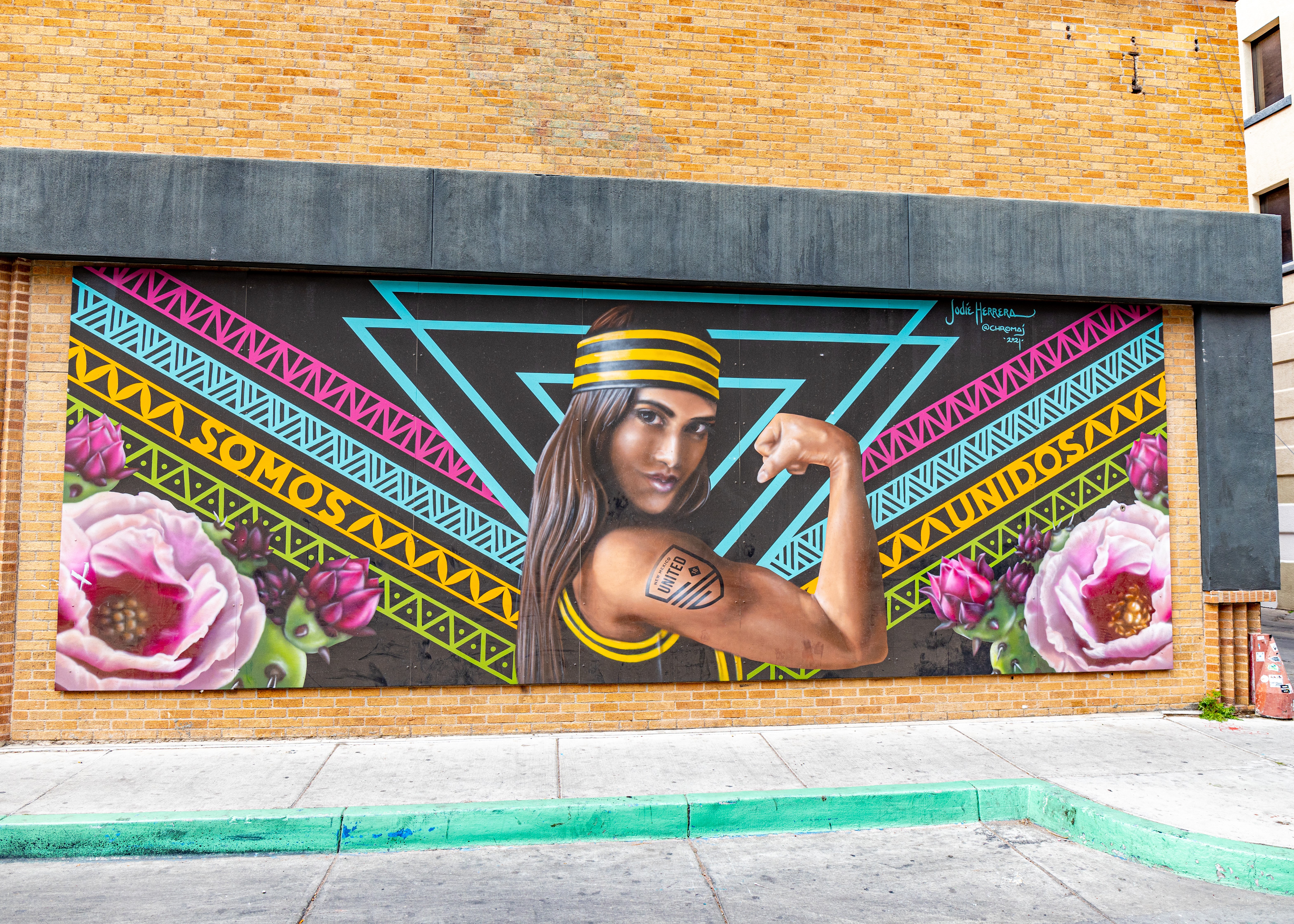 The arts are an important locus for social justice work. This has been true in times past and is increasingly the case locally, nationally, and globally. This course aims to bring together participants with an interest in investigating and investing in social change work through the arts. We will use central New Mexico, specifically the city of Albuquerque, as a case study to explore contemporary social justice topics and how art serves as a medium to communicate these topics with the larger community. Through looking at the exhibitions being presented by our local galleries and museums participants will gain a perspective on what topics are being highlighted and addressed as socially important. Participants will also explore their own social justice topics, create their own art work individually in response to these topics. We will share out at the end of the session. The arts are an important locus for social justice work. This has been true in times past and is increasingly the case locally, nationally, and globally. This course aims to bring together participants with an interest in investigating and investing in social change work through the arts. We will use central New Mexico, specifically the city of Albuquerque, as a case study to explore contemporary social justice topics and how art serves as a medium to communicate these topics with the larger community. Through looking at the exhibitions being presented by our local galleries and museums participants will gain a perspective on what topics are being highlighted and addressed as socially important. Participants will also explore their own social justice topics, create their own art work individually in response to these topics. We will share out at the end of the session.
Tags: Community Engagement, Social Justice, Discussion Practices, Design Thinking/Maker Experiences, Other: Visual Arts
Photo Credit: New Mexico True
3. Bosque School’s Emergency Response Team: Education to Serve Others
Facilitator: Amy Dalness | Challenge Level: Easy
In 2007, three Bosque School students saw a need for public health services and emergency medical support in our school’s community. Inspired by their first aid training (and their science teacher and former fire chief Mr. Dan Shaw, EMT-B), they applied for a grant and used the funds to start the nation’s first Junior Medical Reserve Corps Unit under the Department of Health and Human Services. In the 18-years since, Bosque’s MRC/Emergency Response Team has grown into its own EMS agency recognized by the state of New Mexico, training students to become licensed first responders who dispatch to medical calls on campus, work in the med room alongside our school nurse, and support public health initiatives such as vaccine clinics and medical stand by for large events. During this workshop, you’ll get hands-on training on some of the skills our first responders practice, meet the student leaders responsible for MRC/ERT operations, experience the dispatch procedure during a full-scale emergency response drill, and hear from alumni who’ve credited their medical careers to their time with Bosque School’s MRC unit. You’ll leave with knowledge that could save a life and inspiration to build medical service into your school’s program.
Tags: Community Engagement, Service Learning, Student Leadership
4. Community Science: an Authentic Exercise In Developing Sense Of Place, Appreciation Of Place and a Commitment Of Stewardship To Place
Facilitator: Jim Daly | Challenge Level: Easy
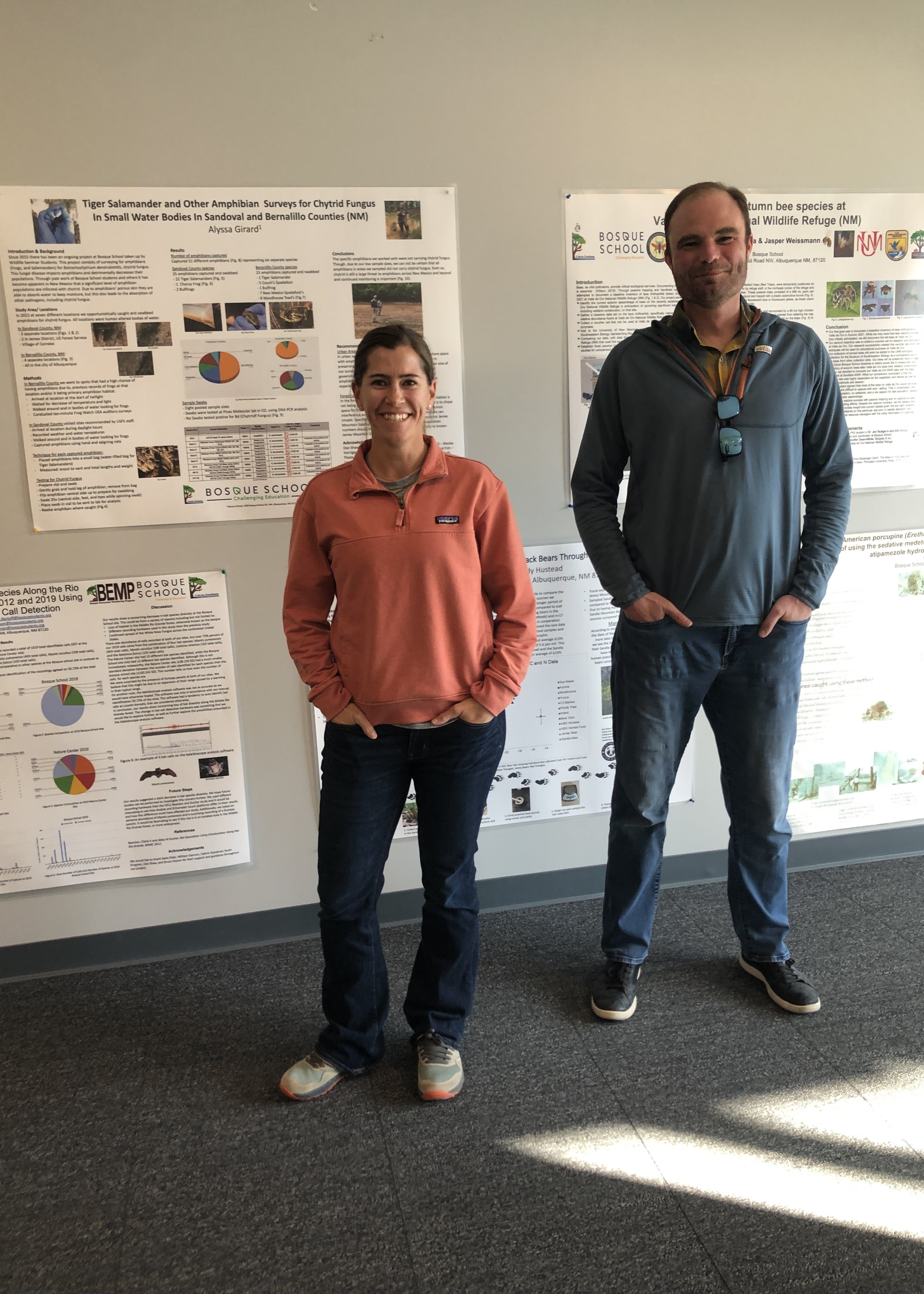 Participants will be directly involved in a community science project focused on monitoring the health of the Rio Grande watershed. Specific focus is placed on the suitability of the monitored stream to support native trout populations and on the effects on the watershed due to climate change. You will be actively engaged with 7th grade students as they lead you through the monitoring protocol and engage you in discussion about the importance of community science and the changes in the watershed that have been documented over 25+ years of monitoring. Group discussion will emphasize the empowering of students to conduct real science, providing the scaffolding necessary for students to safely and properly complete field data collection protocols, to understand the importance of their work in the context of rapidly changing environments, and how these experiences promote a connection to and a sense of stewardship for place. An underlying theme throughout will be an acknowledgement of whose land we are on and how indigenous knowledge informs Western science. Participants will be directly involved in a community science project focused on monitoring the health of the Rio Grande watershed. Specific focus is placed on the suitability of the monitored stream to support native trout populations and on the effects on the watershed due to climate change. You will be actively engaged with 7th grade students as they lead you through the monitoring protocol and engage you in discussion about the importance of community science and the changes in the watershed that have been documented over 25+ years of monitoring. Group discussion will emphasize the empowering of students to conduct real science, providing the scaffolding necessary for students to safely and properly complete field data collection protocols, to understand the importance of their work in the context of rapidly changing environments, and how these experiences promote a connection to and a sense of stewardship for place. An underlying theme throughout will be an acknowledgement of whose land we are on and how indigenous knowledge informs Western science.
Tags: Community Engagement, Sustainability, Global Studies / Citizenship, Outdoor Education, Social Justice, Science, Student Leadership
Photo Credit: ISEEN
5. Cross-Country Skiing and Writing: Trail Tales, a Reflective Trek
Facilitators: Bill Slakey & Charles Gwinn | Challenge Level: Challenging
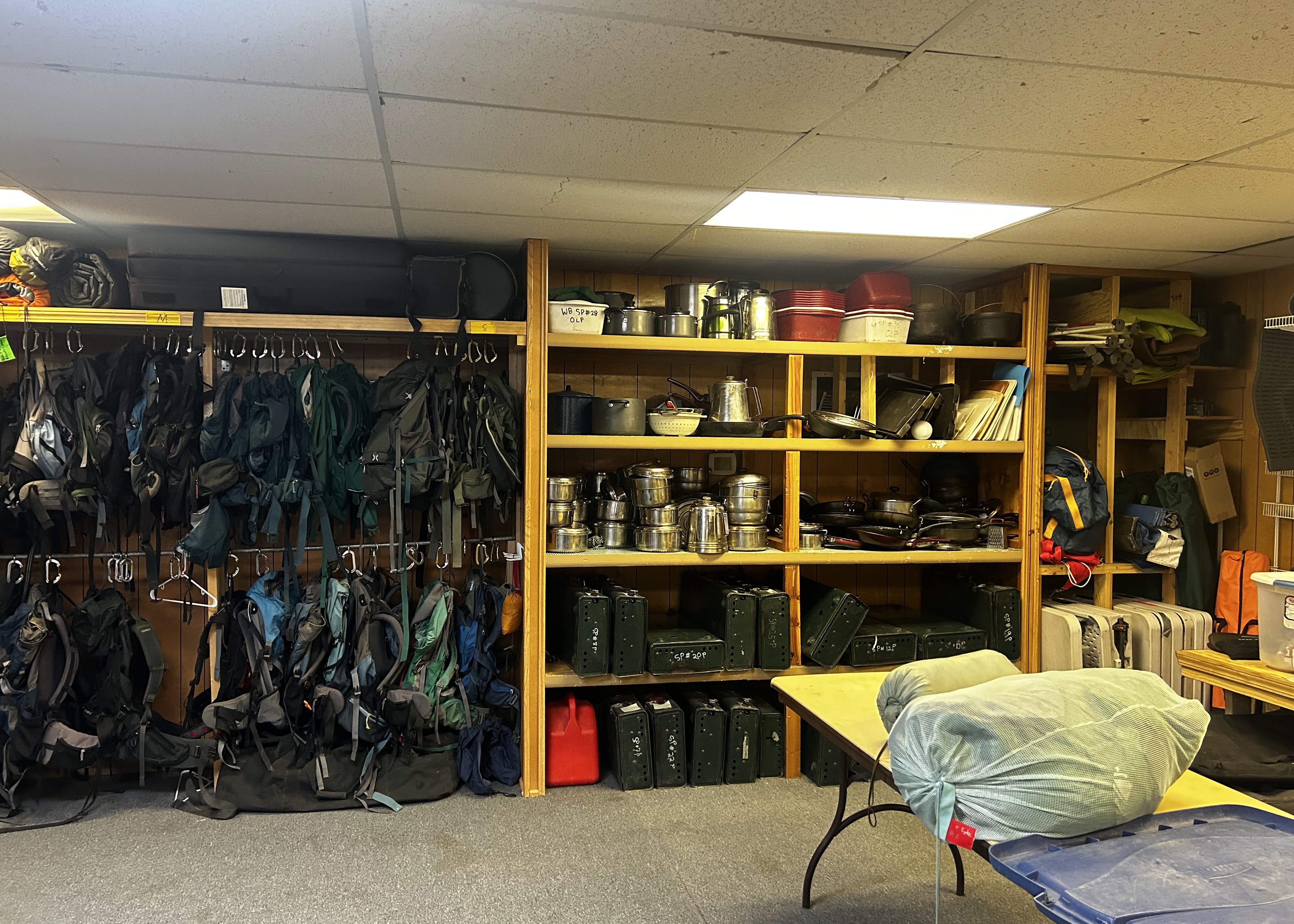 Participants will embark on an afternoon cross-country ski trip in the mountain wilderness of New Mexico and discover the transformative power of free-write journaling based on looped writing prompts that mirror aspects of Kolb’s experiential learning cycle. They’ll also experience structured techniques for sharing their words and offering feedback. We’ll discuss how to employ these techniques in reflecting on experiences of all kinds, in building a supportive peer-feedback community, and in producing effective polished writing. Through frequent journaling stops while skiing, participants will learn some focused peer-feedback exercises that encourage supportive relationships between students and deepen inquiry and reflection. With the landscape as inspiration, participants will try writing and feedback practices for themselves. We’ll also discuss the application in a variety of settings and disciplines. While the terrain is suitable for beginning cross-country skiers, elevation is a consideration. The workshop will provide an introduction to the fundamentals of cross-country skiing. Participants will embark on an afternoon cross-country ski trip in the mountain wilderness of New Mexico and discover the transformative power of free-write journaling based on looped writing prompts that mirror aspects of Kolb’s experiential learning cycle. They’ll also experience structured techniques for sharing their words and offering feedback. We’ll discuss how to employ these techniques in reflecting on experiences of all kinds, in building a supportive peer-feedback community, and in producing effective polished writing. Through frequent journaling stops while skiing, participants will learn some focused peer-feedback exercises that encourage supportive relationships between students and deepen inquiry and reflection. With the landscape as inspiration, participants will try writing and feedback practices for themselves. We’ll also discuss the application in a variety of settings and disciplines. While the terrain is suitable for beginning cross-country skiers, elevation is a consideration. The workshop will provide an introduction to the fundamentals of cross-country skiing.
Tags: Sustainability, Outdoor Education, Discussion Practices, Student Leadership
Photo Credit: ISEEN
6. Dialogue Across Difference: Developing a Student-Led Dialogue Program
Facilitator: Julia Kingsdale | Challenge Level: Easy
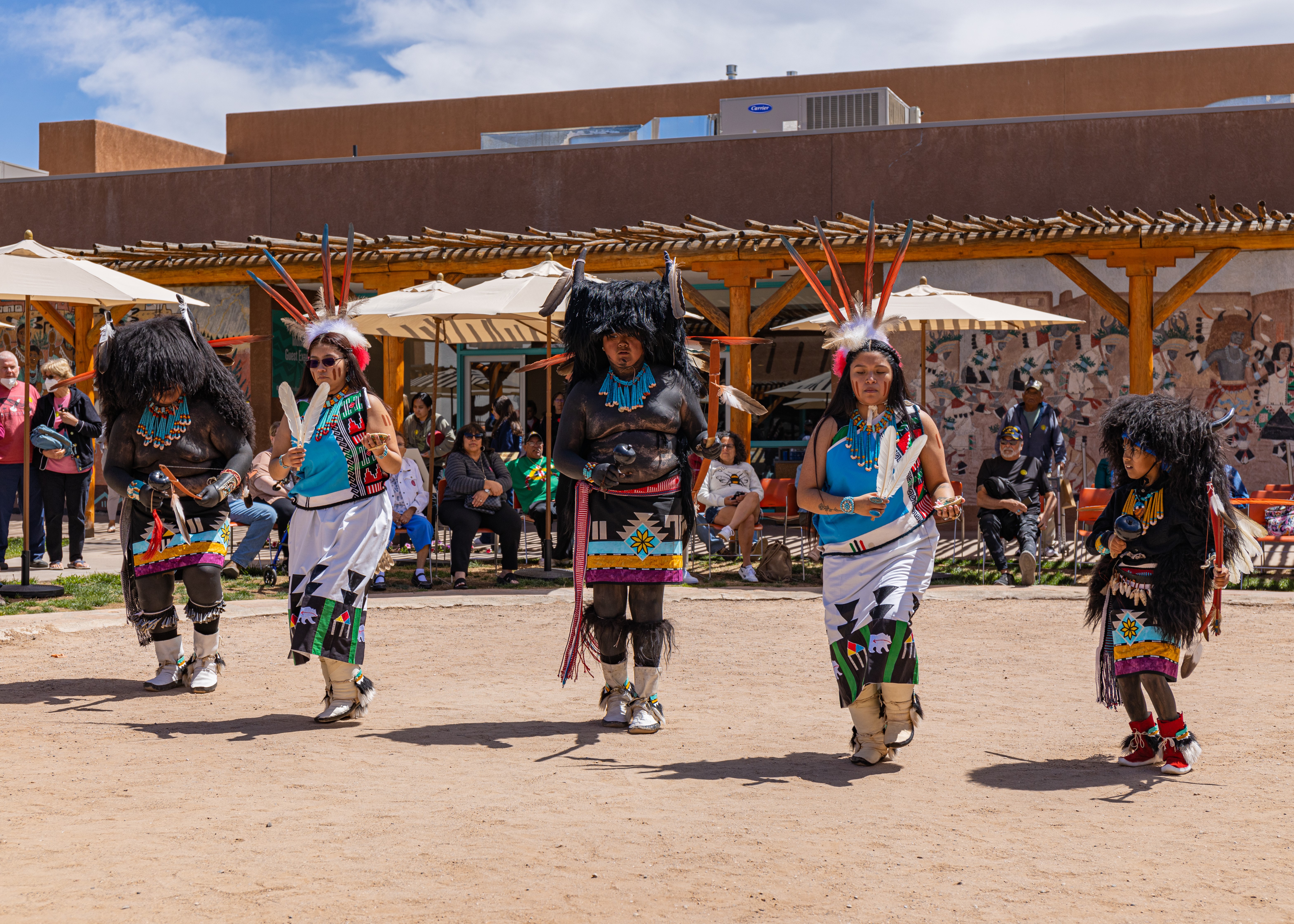 In this workshop, participants will learn how to incorporate student-led dialogue activities into their curricula and other programming for Middle and High School students. Participants will learn directly from student facilitators of Bosque School's Bridge Dialogue Club, which hosts monthly discussions for students, faculty, and staff on a range of difficult political and social topics. Participants will also learn how to prepare student-led dialogues for less experienced student facilitators, as well as how to integrate dialogue activities into their pre-existing curricula. Workshop participants will experience several student-led dialogue activities designed and led by student facilitators from Bosque's Middle and Upper Schools, and they will learn directly from local and national dialogue experts on the transformative power such approaches can have among youth. Finally, participants will be given time and resources for planning how to incorporate these tools within their home institutions. In this workshop, participants will learn how to incorporate student-led dialogue activities into their curricula and other programming for Middle and High School students. Participants will learn directly from student facilitators of Bosque School's Bridge Dialogue Club, which hosts monthly discussions for students, faculty, and staff on a range of difficult political and social topics. Participants will also learn how to prepare student-led dialogues for less experienced student facilitators, as well as how to integrate dialogue activities into their pre-existing curricula. Workshop participants will experience several student-led dialogue activities designed and led by student facilitators from Bosque's Middle and Upper Schools, and they will learn directly from local and national dialogue experts on the transformative power such approaches can have among youth. Finally, participants will be given time and resources for planning how to incorporate these tools within their home institutions.
Tags: Community Engagement, Social Justice
Photo Credit: New Mexico True
7. The Doors Project: Exploring Border Issues Through Art
Facilitator: Claudio Perez | Challenge Level: Easy
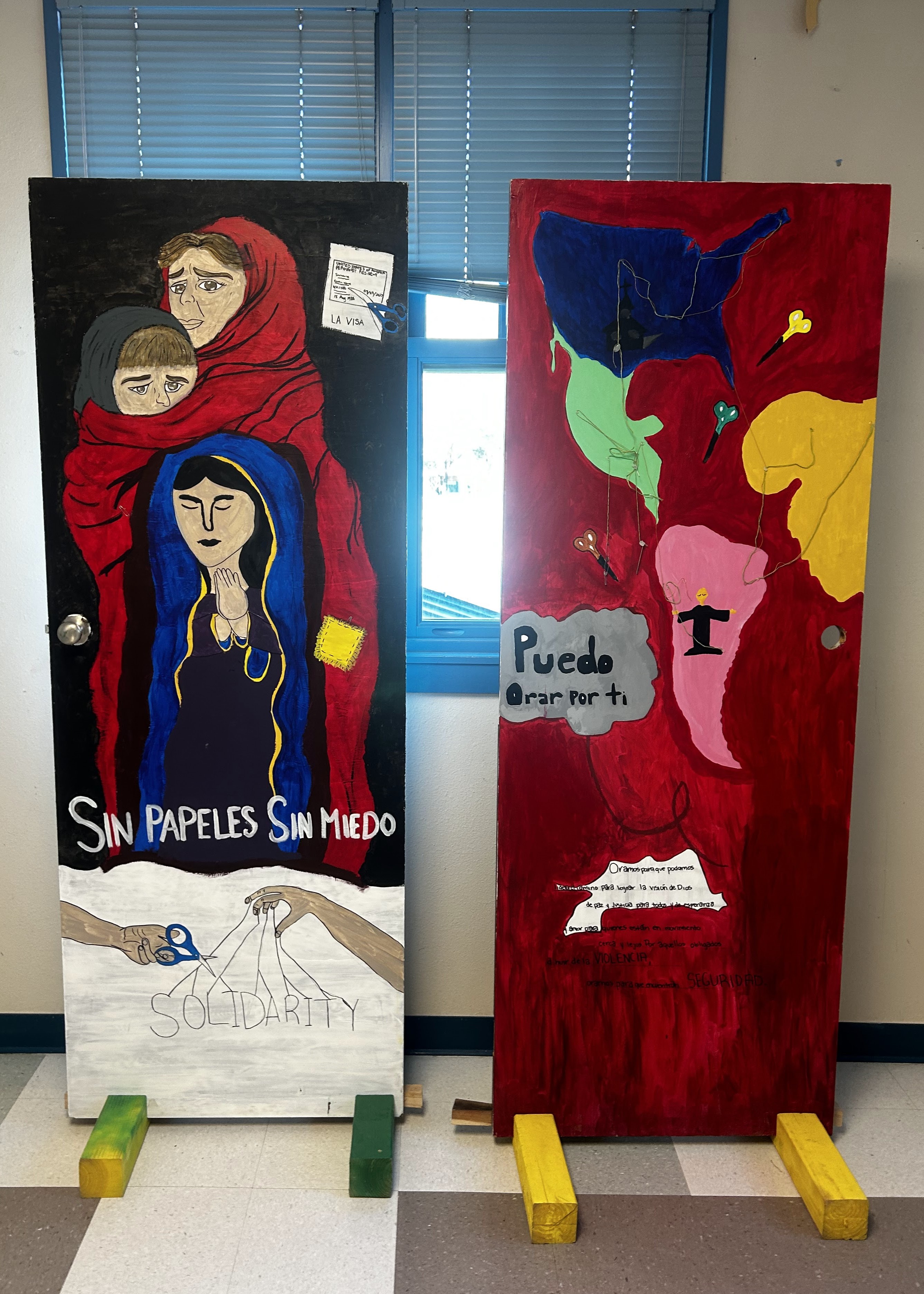 We are excited to invite you to participate in an engaging workshop where we will explore border issues through the lens of art. This workshop will provide a unique opportunity for you to engage with diverse community perspectives and collaborate with cultural institutions, thereby gaining a comprehensive understanding of this significant topic. At the University of New Mexico, you will be privileged to hear from knowledgeable speakers who will provide invaluable insights into border issues and literature. Additionally, you will have the chance to visit the Albuquerque Museum and immerse yourself in the compelling Border Doors exhibit created by our Sandia Prep students, which offers a thought-provoking artistic portrayal of the border experience. Furthermore, a hands-on art session at Sandia Prep School will empower you to express your creativity and interpretations through art. Our primary goal is to equip you with a broader understanding, foster the creation of meaningful artworks, facilitate open dialogue, and most importantly, to cultivate empathy. This will empower you to promote inclusivity and inspire positive change within your classroom. We are excited to invite you to participate in an engaging workshop where we will explore border issues through the lens of art. This workshop will provide a unique opportunity for you to engage with diverse community perspectives and collaborate with cultural institutions, thereby gaining a comprehensive understanding of this significant topic. At the University of New Mexico, you will be privileged to hear from knowledgeable speakers who will provide invaluable insights into border issues and literature. Additionally, you will have the chance to visit the Albuquerque Museum and immerse yourself in the compelling Border Doors exhibit created by our Sandia Prep students, which offers a thought-provoking artistic portrayal of the border experience. Furthermore, a hands-on art session at Sandia Prep School will empower you to express your creativity and interpretations through art. Our primary goal is to equip you with a broader understanding, foster the creation of meaningful artworks, facilitate open dialogue, and most importantly, to cultivate empathy. This will empower you to promote inclusivity and inspire positive change within your classroom.
Tags: Community Engagement, Social Justice, History, Literature, Art
Photo Credit: ISEEN
8. Explorations of the Rio Grande Rift: The Relationship Between Geology And People In Creating Communities
Facilitator: Helen Haskell | Challenge Level: Moderate to Challenging
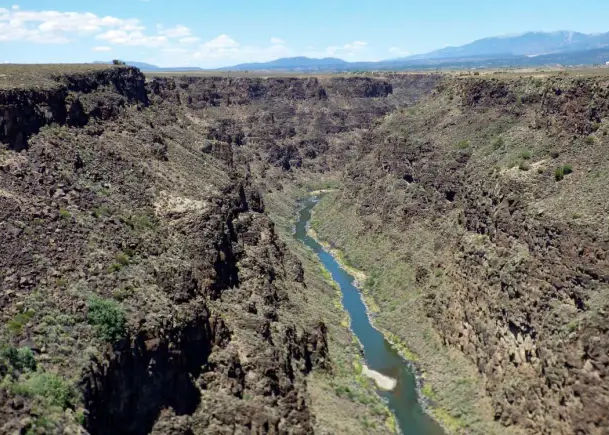 Our ‘journey’ will be spent hiking around and exploring different aspects of the Rio Grande Rift in the Albuquerque area, to examine the role geology has played in community settlement and development in the Middle Rio Grande Basin. Participants will hike over 150,000 year old lava flows, climb volcanoes, and explore the Rio Grande bosque ecosystem; through personal and shared observations and conversations, participants will learn and discuss how specific geologic structures and events have been key in the establishment of communities in this part of New Mexico. Using a variety of journaling techniques and art, reflection will be centered on how the geology has provided resources and challenges, both past and present, for the area residents over the last 10,000+ years, including water issues in New Mexico such as accessibility and flooding control. Discussions will include both the science and history of the area and also how the teacher uses a place based education model with a key emphasis and focus in the geoscience classroom for our students. Our ‘journey’ will be spent hiking around and exploring different aspects of the Rio Grande Rift in the Albuquerque area, to examine the role geology has played in community settlement and development in the Middle Rio Grande Basin. Participants will hike over 150,000 year old lava flows, climb volcanoes, and explore the Rio Grande bosque ecosystem; through personal and shared observations and conversations, participants will learn and discuss how specific geologic structures and events have been key in the establishment of communities in this part of New Mexico. Using a variety of journaling techniques and art, reflection will be centered on how the geology has provided resources and challenges, both past and present, for the area residents over the last 10,000+ years, including water issues in New Mexico such as accessibility and flooding control. Discussions will include both the science and history of the area and also how the teacher uses a place based education model with a key emphasis and focus in the geoscience classroom for our students.
The hikes involve one at the volcanoes of ~3 miles over undulating basalt including short steep elevation gains of 50-100 feet; and a flatter ~2 miles by the river on packed sand.
Tags: Sustainability, Social Justice, Discussion Practices, History, Math, Science
Photo Credit: New Mexico Nomad
9. High School Students Learning With K-8 students through Environmental Education, Art & Ecology
Facilitators: Kim Fike, Dan Shaw, & Donny Kelly-Currens | Challenge Level: Easy
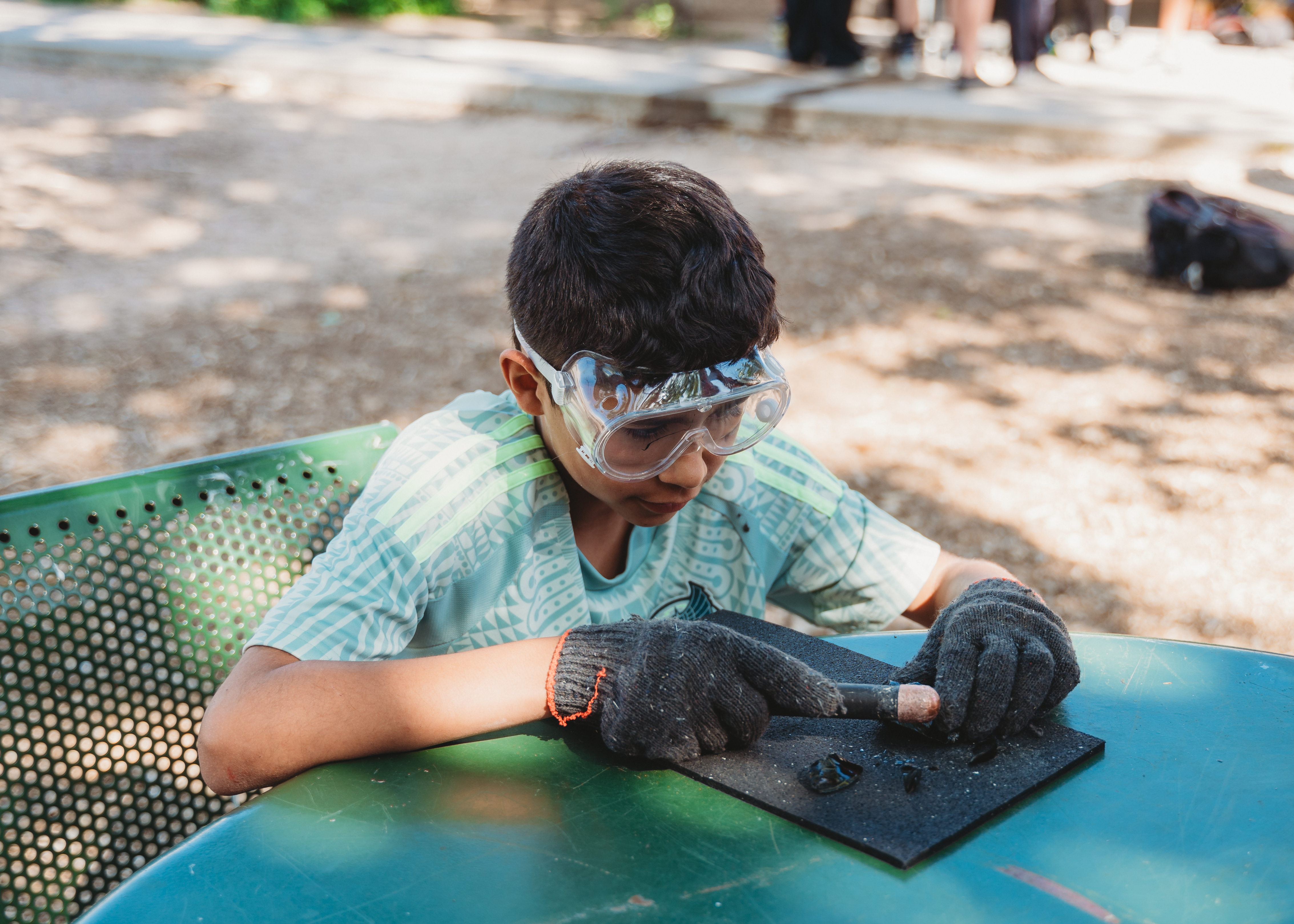 Students are each other’s best teacher. In this program, we aim to model how our Field and Community Science Program fosters confidence and deepens learning in high school aged students as they educate younger visiting student groups. As older students teach about local wildlife and riparian ecology through engaging in hands-on scientific data collections, they cultivate a sense of stewardship and sustainability for our local ecosystems. Workshop participants will learn directly from our field science high school student leaders. Expect to be outside for at least part of the day and participating with students from a visiting K-12 school in our field and community science program. Participants will receive lesson plans for easily carried out and adapted field and community science, art and ecology, and other cross curricular activities. Program leaders will show participants how to start modestly with just a visiting class or two, and build out from there. Program costs and suggestions for funding a field and community science program will also be included in the workshop. Our students will show participants in real time how you don’t begin to know something until you teach it and how you aren’t done with it until you share it. Students are each other’s best teacher. In this program, we aim to model how our Field and Community Science Program fosters confidence and deepens learning in high school aged students as they educate younger visiting student groups. As older students teach about local wildlife and riparian ecology through engaging in hands-on scientific data collections, they cultivate a sense of stewardship and sustainability for our local ecosystems. Workshop participants will learn directly from our field science high school student leaders. Expect to be outside for at least part of the day and participating with students from a visiting K-12 school in our field and community science program. Participants will receive lesson plans for easily carried out and adapted field and community science, art and ecology, and other cross curricular activities. Program leaders will show participants how to start modestly with just a visiting class or two, and build out from there. Program costs and suggestions for funding a field and community science program will also be included in the workshop. Our students will show participants in real time how you don’t begin to know something until you teach it and how you aren’t done with it until you share it.
Tags: Community Engagement, Sustainability, Outdoor Education, Science, Student Leadership
Photo Credit: Bosque School
10. Making a Difference through Hands-On Wildlife Research
Facilitators: Daniel Shaw | Challenge Level: Moderate
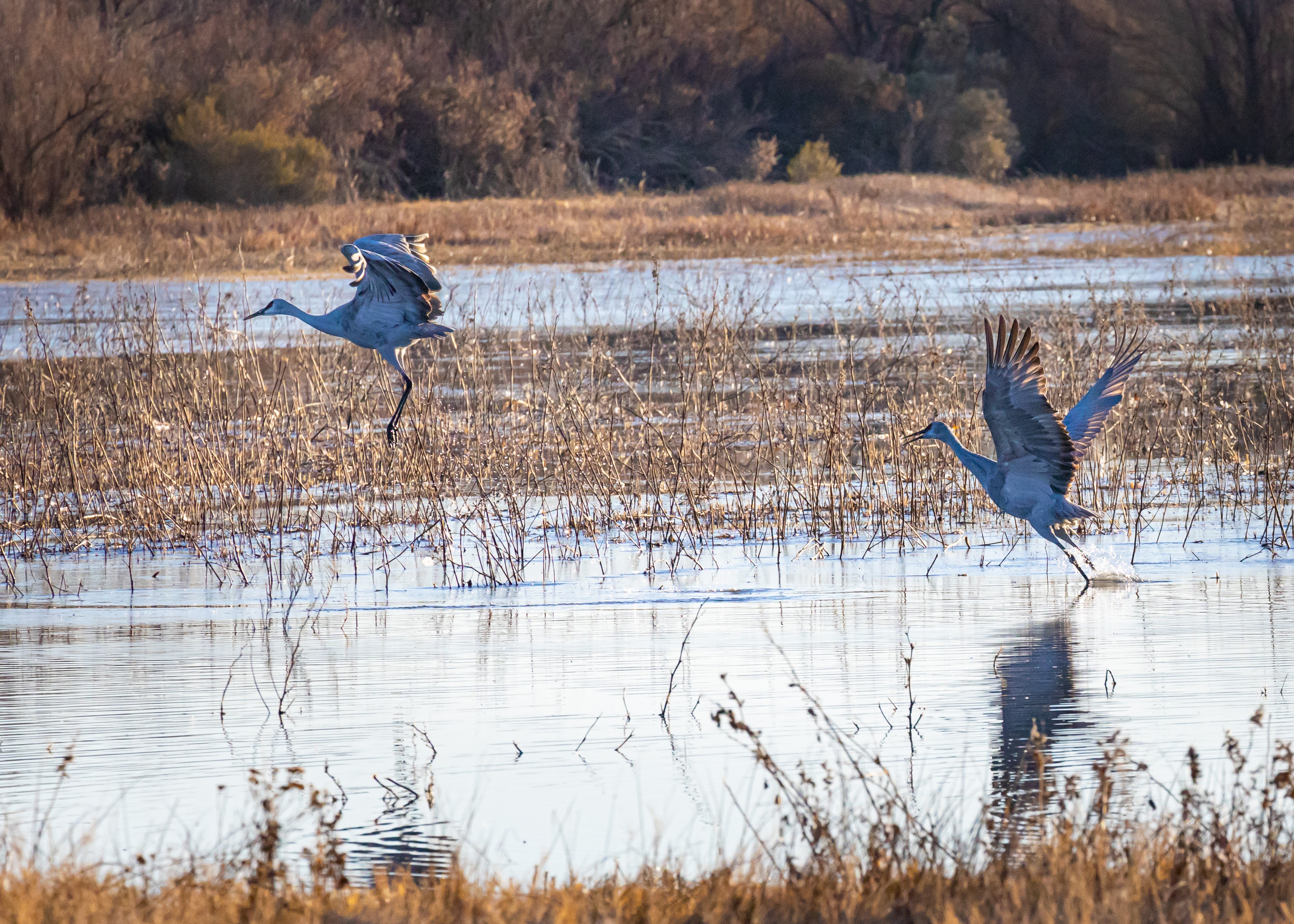 We do science that matters beyond the classroom. At Bosque School, students in our Wildlife Research Seminar engage in one to multi-year, wildlife field research projects. Recent projects include students radio-collaring porcupines, conducting rodent genetic analysis, and detecting a lethal fungus on amphibians. Students create and defend ethical research plans, carry out their projects, manage data, and then deliver their findings and analysis at formal scientific meetings, where they are almost always the only high school students presenting. Through university partnerships, students often conduct original DNA, stable isotope, and other lab work on their field samples. Student findings are directly used by government agencies to inform their management of wildlife and their habitats. Like most everything else done in our wildlife seminar, this ISEEN workshop will be led by high school students. They will take participants through several examples of projects that can be replicated and maintained with low costs as well as some that are more complicated and ambitious. You can expect to walk away with template wildlife research protocols, information about the ethical and legal issues of live animal research, and a sense of how to start small, and expand over time. Expect to be outside with wildlife for much of the day. Actual profiled species and projects will depend on day-of-workshop weather. This work builds from our school’s mission statement component about learning from place and is part of our work in preparing students, particularly those underrepresented in science, to be full participants in scientific endeavors. We do science that matters beyond the classroom. At Bosque School, students in our Wildlife Research Seminar engage in one to multi-year, wildlife field research projects. Recent projects include students radio-collaring porcupines, conducting rodent genetic analysis, and detecting a lethal fungus on amphibians. Students create and defend ethical research plans, carry out their projects, manage data, and then deliver their findings and analysis at formal scientific meetings, where they are almost always the only high school students presenting. Through university partnerships, students often conduct original DNA, stable isotope, and other lab work on their field samples. Student findings are directly used by government agencies to inform their management of wildlife and their habitats. Like most everything else done in our wildlife seminar, this ISEEN workshop will be led by high school students. They will take participants through several examples of projects that can be replicated and maintained with low costs as well as some that are more complicated and ambitious. You can expect to walk away with template wildlife research protocols, information about the ethical and legal issues of live animal research, and a sense of how to start small, and expand over time. Expect to be outside with wildlife for much of the day. Actual profiled species and projects will depend on day-of-workshop weather. This work builds from our school’s mission statement component about learning from place and is part of our work in preparing students, particularly those underrepresented in science, to be full participants in scientific endeavors.
Tags: Community Engagement, Service Learning, Outdoor Education, Science, Sustainability, Student Leadership
Photo Credit: New Mexico True
11. Last Stop on El Camino Real
Facilitator: Sora Wondra | Challenge Level: Moderate
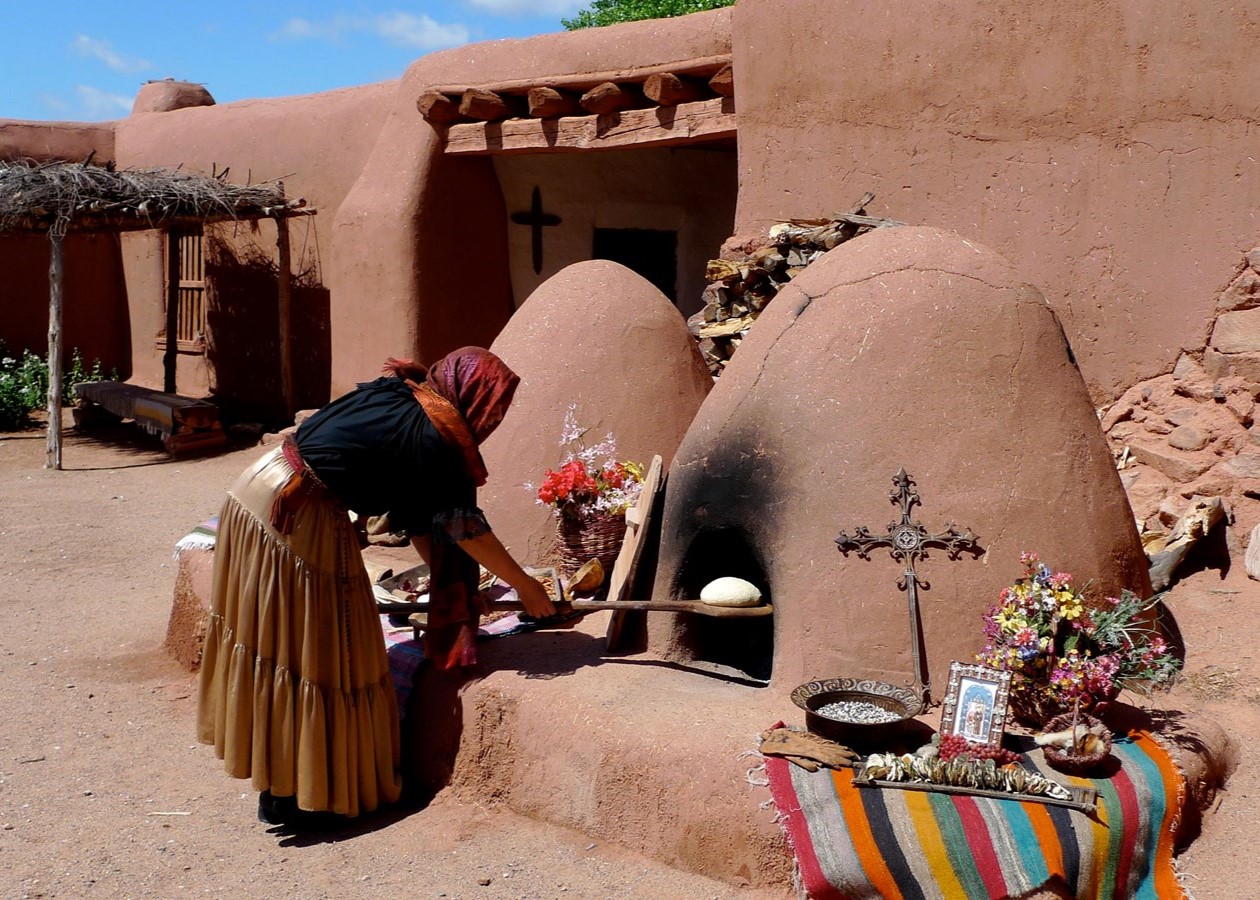 The “Royal Road” was the primary route from Mexico City to Santa Fe for over 400 years, and was developed by linking existing indigenous pathways. In New Mexico today, the route is overlaid by the Interstate 25 Pan American highway. In this workshop, ISEEN participants will be engaged in abstract conceptualization around maps (using Google Maps) of the route today to begin to grapple with this incredible 1,400 mile journey which was often completed on foot. Participants will experiment with creating maps to trip planning along the modern route. This preparation on the Sandia Prep campus will be followed by an excursion to Ranchos de los Golondrinas, which was the last paraje (rest stop) on El Camino Real. We will hike part of the trail and connect with the echoes of those that walked here before us. The day will close with a reflection on how participant’s regional roads may have a complex and layered history, and how that helps us locate ourselves. The “Royal Road” was the primary route from Mexico City to Santa Fe for over 400 years, and was developed by linking existing indigenous pathways. In New Mexico today, the route is overlaid by the Interstate 25 Pan American highway. In this workshop, ISEEN participants will be engaged in abstract conceptualization around maps (using Google Maps) of the route today to begin to grapple with this incredible 1,400 mile journey which was often completed on foot. Participants will experiment with creating maps to trip planning along the modern route. This preparation on the Sandia Prep campus will be followed by an excursion to Ranchos de los Golondrinas, which was the last paraje (rest stop) on El Camino Real. We will hike part of the trail and connect with the echoes of those that walked here before us. The day will close with a reflection on how participant’s regional roads may have a complex and layered history, and how that helps us locate ourselves.
Tags: Community Engagement, Outdoor Education, History
Photo Credit: National Parks Service
12. Let’s New Mexi-Go! Self & History on the Red Rocks Trail
Facilitators: Aaron Morales & Julia Manganaro | Challenge Level: Moderate
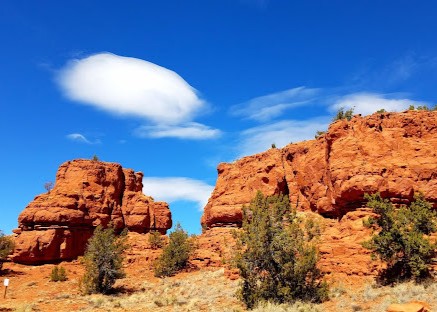 New Mexico has so many fantastic offerings with rich histories. In this course, we will explore one selection of the locations that is a part of the course - The Jemez Pueblo and historic Red Rocks Trail. Working with the Waltowa Welcome Center, participants will learn about the history of the region and environment through and indigenous perspective. Participants will hike on the Red Rocks Trail and reflect on their experiences through documentation of their travels and discoveries through the medium of travel blogging, creating videos filled with information as well as self discovery. Overall, participants will gain insight into their sense of self as it relates to the surrounding environment, its history, and the responsibilities we have as educators in negotiating this space. Get ready to New MexiGO on the adventure of a lifetime! New Mexico has so many fantastic offerings with rich histories. In this course, we will explore one selection of the locations that is a part of the course - The Jemez Pueblo and historic Red Rocks Trail. Working with the Waltowa Welcome Center, participants will learn about the history of the region and environment through and indigenous perspective. Participants will hike on the Red Rocks Trail and reflect on their experiences through documentation of their travels and discoveries through the medium of travel blogging, creating videos filled with information as well as self discovery. Overall, participants will gain insight into their sense of self as it relates to the surrounding environment, its history, and the responsibilities we have as educators in negotiating this space. Get ready to New MexiGO on the adventure of a lifetime!
Tags: Community Engagement, Global Studies/Citizenship, Outdoor Education, Design Thinking/Maker Experiences
Photo Credit: Waltowa Welcome Center
13. One Shape, One Location
Facilitator: Waseem Touma | Challenge Level: Easy
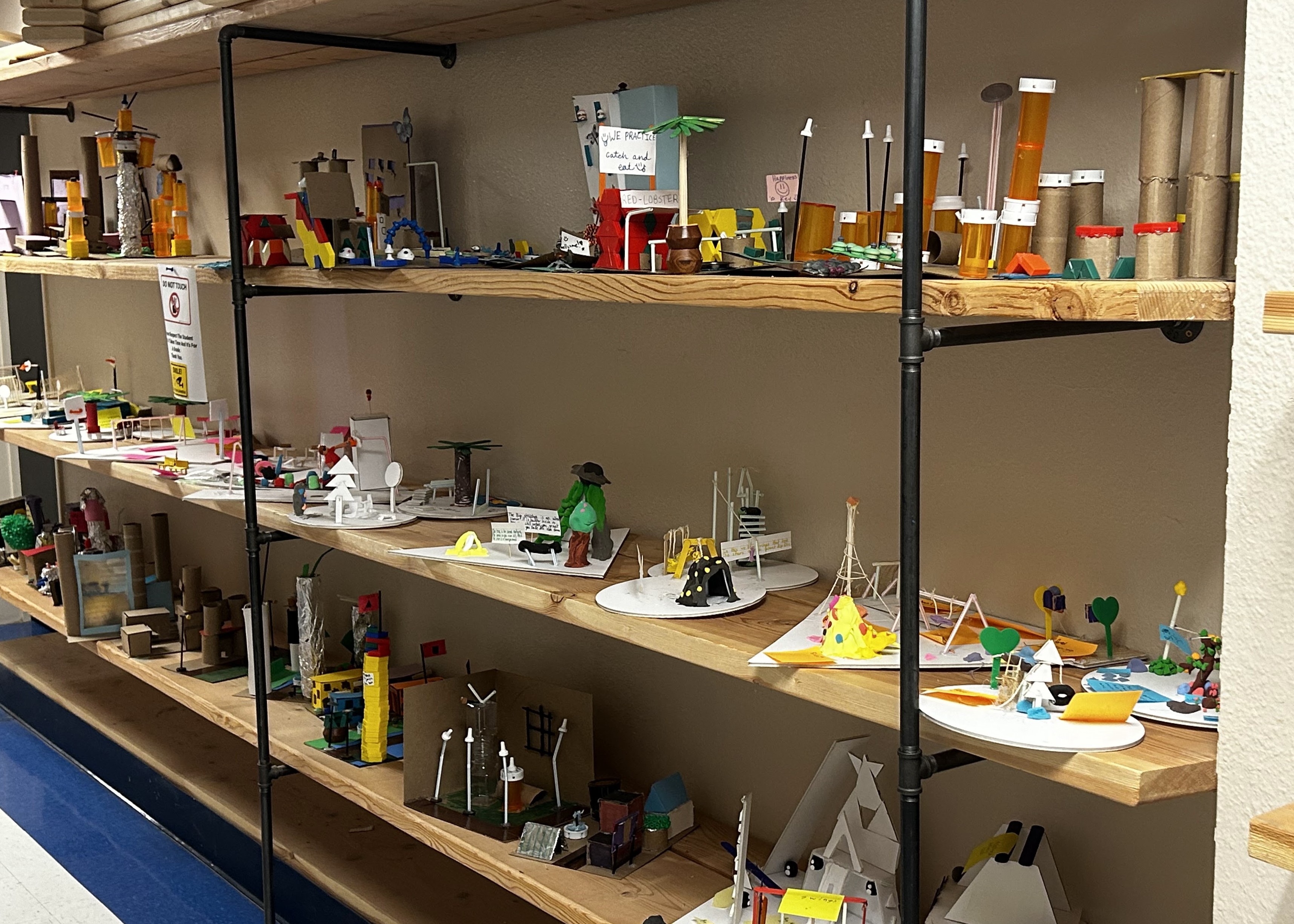 How would you like to be an architect for the day and practice designing an architectural structure using one particular shape in a particular location? Inspired by Frank Loyd Wright, who would often use a shape or pattern found in nature as the foundation to his design, this workshop involves being assigned one shape such as a circle, square, or triangle, and using it as the starting point to design an architectural structure in a particular location like the arctic or the mountains or the seaside. We roll the dice and let chance decide what shape and location we work with. The structure will be your choice depending on what you think that location could benefit from. A treehouse in the mountains? A coffee shop by the seaside? An oasis in the desert? We will research our designated locations considering environmental impact, history of any indigenous cultures that may live there, sustainability, accessibility, aesthetics, and potential materials, while we playfully experiment with using our one shape as the foundation of our designs. We will do some fun drawing exercises as well as quick prototype structures, called 3D sketching. This will lead us to our final presentation of our research, sketches, floor plan designs and architectural models. How would you like to be an architect for the day and practice designing an architectural structure using one particular shape in a particular location? Inspired by Frank Loyd Wright, who would often use a shape or pattern found in nature as the foundation to his design, this workshop involves being assigned one shape such as a circle, square, or triangle, and using it as the starting point to design an architectural structure in a particular location like the arctic or the mountains or the seaside. We roll the dice and let chance decide what shape and location we work with. The structure will be your choice depending on what you think that location could benefit from. A treehouse in the mountains? A coffee shop by the seaside? An oasis in the desert? We will research our designated locations considering environmental impact, history of any indigenous cultures that may live there, sustainability, accessibility, aesthetics, and potential materials, while we playfully experiment with using our one shape as the foundation of our designs. We will do some fun drawing exercises as well as quick prototype structures, called 3D sketching. This will lead us to our final presentation of our research, sketches, floor plan designs and architectural models.
As a group, we can reflect on what is involved in creating a space in a particular environment, with the most fundamental amenities that we often take for granted. Also adding human made materials and construction to the natural world, and what impact does our footprint leave behind. Finally, how has this project changed our perspective on how we see the world and how we interact with the world and other living things around us.
Tags: Sustainability, Global Studies/Citizenship, Design Thinking/Maker Experiences
Photo Credit: ISEEN
14. Resilience from Carlisle to Albuquerque: Unveiling Indigenous Voices Through Boarding School Archives
Facilitator: Renee Perkins | Challenge Level: Easy
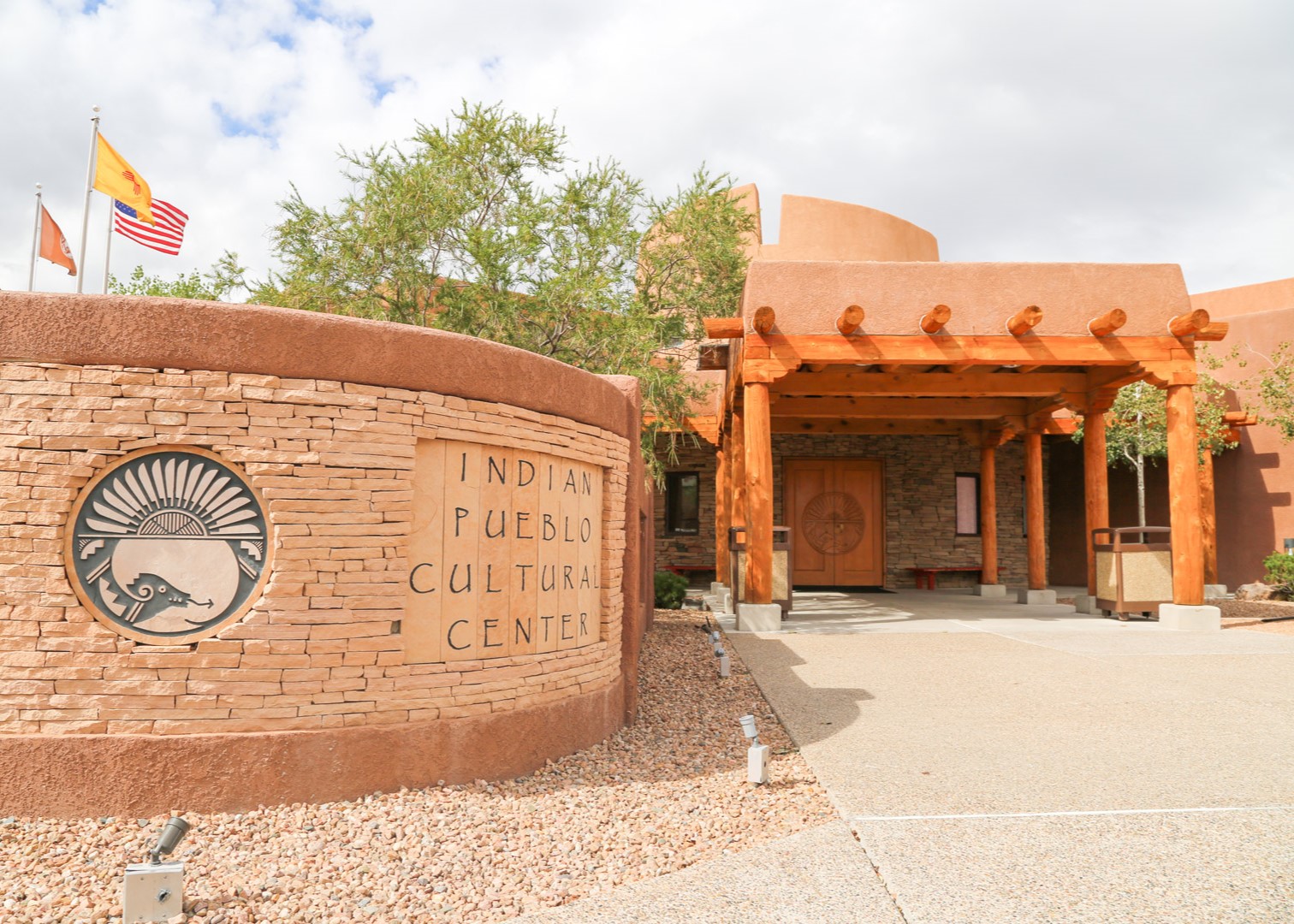 This workshop aims to immerse participants in the history and culture surrounding the Carlisle Indian Boarding Schools while also exploring the modern-day Pueblo culture at the Indian Pueblo Cultural Center. Participants will engage in personal research on a specific student from the Carlisle Indian Boarding School, using primary sources and journals. The day will culminate in a visit to the Indian Pueblo Cultural Center in Albuquerque, providing first hand exposure to Pueblo culture and its significance in the context of the original Albuquerque Indian School. Through this experience, participants will gain insights into the power of primary sources, storytelling, and localized history in education, with a focus on diversity, equity, inclusion, and justice. This workshop aims to immerse participants in the history and culture surrounding the Carlisle Indian Boarding Schools while also exploring the modern-day Pueblo culture at the Indian Pueblo Cultural Center. Participants will engage in personal research on a specific student from the Carlisle Indian Boarding School, using primary sources and journals. The day will culminate in a visit to the Indian Pueblo Cultural Center in Albuquerque, providing first hand exposure to Pueblo culture and its significance in the context of the original Albuquerque Indian School. Through this experience, participants will gain insights into the power of primary sources, storytelling, and localized history in education, with a focus on diversity, equity, inclusion, and justice.
Tags: Community Engagement, Social Justice, History, Other: Diversity, Equity, and Inclusion
Photo Credit: Indian Pueblo Cultural Center
15. Student Impact Through Adapted Toys
Facilitator: Arren Buck | Challenge Level: Easy
Participants will engage with the engineering design process to develop a small scale prototype of a toy for a student with special needs. The goal will be to include discussions about disabilities and to encourage the understanding of how we can apply the engineering design process to develop solutions for those with different abilities. Analyzing the needs of others allows participants to see the world through a different view point and to provide an opportunity to make for others.
Tags: Service Learning; Community Engagement; Social Justice; Design Thinking/Maker Experiences
16. Tapping into the Power of Digital Humanities to Increase Student Engagement Across the Disciplines
Facilitator: Erin Zavitz | Challenge Level: Easy
Oohs and aahs echo throughout the classroom as students complete the final steps and see the digital project they’ve created. Looking for ways to engage students in storytelling or constructing narratives beyond traditional written assignments? Digital Humanities is now an established field that brings together technology and reading and writing to encourage students to create multimodal projects that convey their learning and knowledge in non-traditional forms. Moreover, the format often allows for the interaction of text and images to add creative space for students and encourage them to reflect on how words and images combine to tell a story. While the name implies a focus on Humanities skills such as synthesizing and summarizing information, understanding causation, continuity, and change over time, and crafting narratives, the act of digital storytelling applies to multiple disciplines. This workshop will introduce two open-access programs that allow students to either build a timeline or storymap. Individuals will have the opportunity to explore the programs, build their own timeline and map, create a lesson plan, and receive feedback from participants. The goal is to have each participant walk away with a usable lesson plan they can implement in their classroom.
Tags: Social Justice, Discussion Practices, History, Literature, Global Languages, Math, Science
|
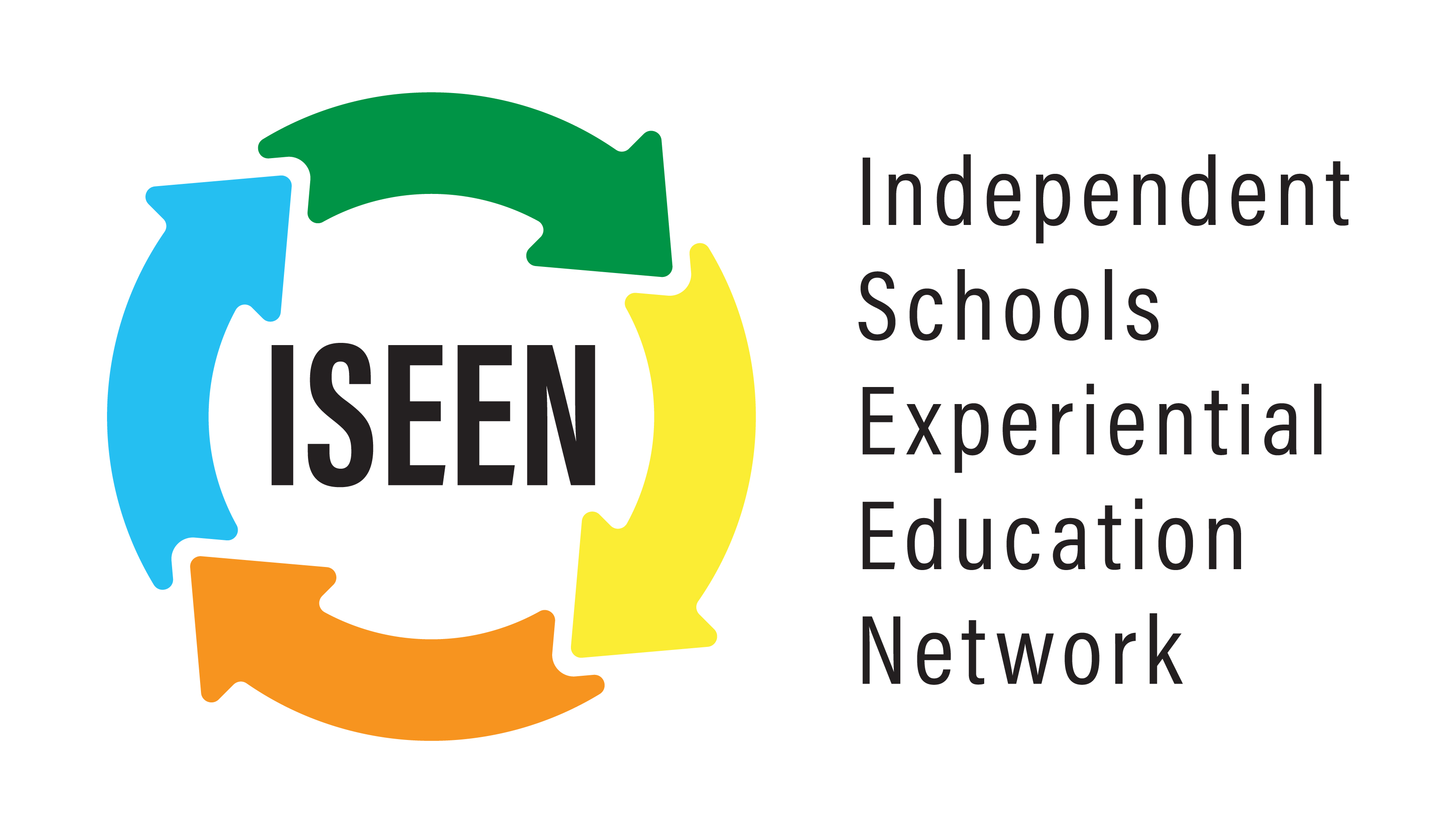
 The arts are an important locus for social justice work. This has been true in times past and is increasingly the case locally, nationally, and globally. This course aims to bring together participants with an interest in investigating and investing in social change work through the arts. We will use central New Mexico, specifically the city of Albuquerque, as a case study to explore contemporary social justice topics and how art serves as a medium to communicate these topics with the larger community. Through looking at the exhibitions being presented by our local galleries and museums participants will gain a perspective on what topics are being highlighted and addressed as socially important. Participants will also explore their own social justice topics, create their own art work individually in response to these topics. We will share out at the end of the session.
The arts are an important locus for social justice work. This has been true in times past and is increasingly the case locally, nationally, and globally. This course aims to bring together participants with an interest in investigating and investing in social change work through the arts. We will use central New Mexico, specifically the city of Albuquerque, as a case study to explore contemporary social justice topics and how art serves as a medium to communicate these topics with the larger community. Through looking at the exhibitions being presented by our local galleries and museums participants will gain a perspective on what topics are being highlighted and addressed as socially important. Participants will also explore their own social justice topics, create their own art work individually in response to these topics. We will share out at the end of the session. Participants will be directly involved in a community science project focused on monitoring the health of the Rio Grande watershed. Specific focus is placed on the suitability of the monitored stream to support native trout populations and on the effects on the watershed due to climate change. You will be actively engaged with 7th grade students as they lead you through the monitoring protocol and engage you in discussion about the importance of community science and the changes in the watershed that have been documented over 25+ years of monitoring. Group discussion will emphasize the empowering of students to conduct real science, providing the scaffolding necessary for students to safely and properly complete field data collection protocols, to understand the importance of their work in the context of rapidly changing environments, and how these experiences promote a connection to and a sense of stewardship for place. An underlying theme throughout will be an acknowledgement of whose land we are on and how indigenous knowledge informs Western science.
Participants will be directly involved in a community science project focused on monitoring the health of the Rio Grande watershed. Specific focus is placed on the suitability of the monitored stream to support native trout populations and on the effects on the watershed due to climate change. You will be actively engaged with 7th grade students as they lead you through the monitoring protocol and engage you in discussion about the importance of community science and the changes in the watershed that have been documented over 25+ years of monitoring. Group discussion will emphasize the empowering of students to conduct real science, providing the scaffolding necessary for students to safely and properly complete field data collection protocols, to understand the importance of their work in the context of rapidly changing environments, and how these experiences promote a connection to and a sense of stewardship for place. An underlying theme throughout will be an acknowledgement of whose land we are on and how indigenous knowledge informs Western science. Participants will embark on an afternoon cross-country ski trip in the mountain wilderness of New Mexico and discover the transformative power of free-write journaling based on looped writing prompts that mirror aspects of Kolb’s experiential learning cycle. They’ll also experience structured techniques for sharing their words and offering feedback. We’ll discuss how to employ these techniques in reflecting on experiences of all kinds, in building a supportive peer-feedback community, and in producing effective polished writing. Through frequent journaling stops while skiing, participants will learn some focused peer-feedback exercises that encourage supportive relationships between students and deepen inquiry and reflection. With the landscape as inspiration, participants will try writing and feedback practices for themselves. We’ll also discuss the application in a variety of settings and disciplines. While the terrain is suitable for beginning cross-country skiers, elevation is a consideration. The workshop will provide an introduction to the fundamentals of cross-country skiing.
Participants will embark on an afternoon cross-country ski trip in the mountain wilderness of New Mexico and discover the transformative power of free-write journaling based on looped writing prompts that mirror aspects of Kolb’s experiential learning cycle. They’ll also experience structured techniques for sharing their words and offering feedback. We’ll discuss how to employ these techniques in reflecting on experiences of all kinds, in building a supportive peer-feedback community, and in producing effective polished writing. Through frequent journaling stops while skiing, participants will learn some focused peer-feedback exercises that encourage supportive relationships between students and deepen inquiry and reflection. With the landscape as inspiration, participants will try writing and feedback practices for themselves. We’ll also discuss the application in a variety of settings and disciplines. While the terrain is suitable for beginning cross-country skiers, elevation is a consideration. The workshop will provide an introduction to the fundamentals of cross-country skiing. In this workshop, participants will learn how to incorporate student-led dialogue activities into their curricula and other programming for Middle and High School students. Participants will learn directly from student facilitators of Bosque School's Bridge Dialogue Club, which hosts monthly discussions for students, faculty, and staff on a range of difficult political and social topics. Participants will also learn how to prepare student-led dialogues for less experienced student facilitators, as well as how to integrate dialogue activities into their pre-existing curricula. Workshop participants will experience several student-led dialogue activities designed and led by student facilitators from Bosque's Middle and Upper Schools, and they will learn directly from local and national dialogue experts on the transformative power such approaches can have among youth. Finally, participants will be given time and resources for planning how to incorporate these tools within their home institutions.
In this workshop, participants will learn how to incorporate student-led dialogue activities into their curricula and other programming for Middle and High School students. Participants will learn directly from student facilitators of Bosque School's Bridge Dialogue Club, which hosts monthly discussions for students, faculty, and staff on a range of difficult political and social topics. Participants will also learn how to prepare student-led dialogues for less experienced student facilitators, as well as how to integrate dialogue activities into their pre-existing curricula. Workshop participants will experience several student-led dialogue activities designed and led by student facilitators from Bosque's Middle and Upper Schools, and they will learn directly from local and national dialogue experts on the transformative power such approaches can have among youth. Finally, participants will be given time and resources for planning how to incorporate these tools within their home institutions. We are excited to invite you to participate in an engaging workshop where we will explore border issues through the lens of art. This workshop will provide a unique opportunity for you to engage with diverse community perspectives and collaborate with cultural institutions, thereby gaining a comprehensive understanding of this significant topic. At the University of New Mexico, you will be privileged to hear from knowledgeable speakers who will provide invaluable insights into border issues and literature. Additionally, you will have the chance to visit the Albuquerque Museum and immerse yourself in the compelling Border Doors exhibit created by our Sandia Prep students, which offers a thought-provoking artistic portrayal of the border experience. Furthermore, a hands-on art session at Sandia Prep School will empower you to express your creativity and interpretations through art. Our primary goal is to equip you with a broader understanding, foster the creation of meaningful artworks, facilitate open dialogue, and most importantly, to cultivate empathy. This will empower you to promote inclusivity and inspire positive change within your classroom.
We are excited to invite you to participate in an engaging workshop where we will explore border issues through the lens of art. This workshop will provide a unique opportunity for you to engage with diverse community perspectives and collaborate with cultural institutions, thereby gaining a comprehensive understanding of this significant topic. At the University of New Mexico, you will be privileged to hear from knowledgeable speakers who will provide invaluable insights into border issues and literature. Additionally, you will have the chance to visit the Albuquerque Museum and immerse yourself in the compelling Border Doors exhibit created by our Sandia Prep students, which offers a thought-provoking artistic portrayal of the border experience. Furthermore, a hands-on art session at Sandia Prep School will empower you to express your creativity and interpretations through art. Our primary goal is to equip you with a broader understanding, foster the creation of meaningful artworks, facilitate open dialogue, and most importantly, to cultivate empathy. This will empower you to promote inclusivity and inspire positive change within your classroom.  Our ‘journey’ will be spent hiking around and exploring different aspects of the Rio Grande Rift in the Albuquerque area, to examine the role geology has played in community settlement and development in the Middle Rio Grande Basin. Participants will hike over 150,000 year old lava flows, climb volcanoes, and explore the Rio Grande bosque ecosystem; through personal and shared observations and conversations, participants will learn and discuss how specific geologic structures and events have been key in the establishment of communities in this part of New Mexico. Using a variety of journaling techniques and art, reflection will be centered on how the geology has provided resources and challenges, both past and present, for the area residents over the last 10,000+ years, including water issues in New Mexico such as accessibility and flooding control. Discussions will include both the science and history of the area and also how the teacher uses a place based education model with a key emphasis and focus in the geoscience classroom for our students.
Our ‘journey’ will be spent hiking around and exploring different aspects of the Rio Grande Rift in the Albuquerque area, to examine the role geology has played in community settlement and development in the Middle Rio Grande Basin. Participants will hike over 150,000 year old lava flows, climb volcanoes, and explore the Rio Grande bosque ecosystem; through personal and shared observations and conversations, participants will learn and discuss how specific geologic structures and events have been key in the establishment of communities in this part of New Mexico. Using a variety of journaling techniques and art, reflection will be centered on how the geology has provided resources and challenges, both past and present, for the area residents over the last 10,000+ years, including water issues in New Mexico such as accessibility and flooding control. Discussions will include both the science and history of the area and also how the teacher uses a place based education model with a key emphasis and focus in the geoscience classroom for our students. Students are each other’s best teacher. In this program, we aim to model how our Field and Community Science Program fosters confidence and deepens learning in high school aged students as they educate younger visiting student groups. As older students teach about local wildlife and riparian ecology through engaging in hands-on scientific data collections, they cultivate a sense of stewardship and sustainability for our local ecosystems.
Students are each other’s best teacher. In this program, we aim to model how our Field and Community Science Program fosters confidence and deepens learning in high school aged students as they educate younger visiting student groups. As older students teach about local wildlife and riparian ecology through engaging in hands-on scientific data collections, they cultivate a sense of stewardship and sustainability for our local ecosystems.  We do science that matters beyond the classroom. At Bosque School, students in our Wildlife Research Seminar engage in one to multi-year, wildlife field research projects. Recent projects include students radio-collaring porcupines, conducting rodent genetic analysis, and detecting a lethal fungus on amphibians. Students create and defend ethical research plans, carry out their projects, manage data, and then deliver their findings and analysis at formal scientific meetings, where they are almost always the only high school students presenting. Through university partnerships, students often conduct original DNA, stable isotope, and other lab work on their field samples. Student findings are directly used by government agencies to inform their management of wildlife and their habitats. Like most everything else done in our wildlife seminar, this ISEEN workshop will be led by high school students. They will take participants through several examples of projects that can be replicated and maintained with low costs as well as some that are more complicated and ambitious. You can expect to walk away with template wildlife research protocols, information about the ethical and legal issues of live animal research, and a sense of how to start small, and expand over time. Expect to be outside with wildlife for much of the day. Actual profiled species and projects will depend on day-of-workshop weather. This work builds from our school’s mission statement component about learning from place and is part of our work in preparing students, particularly those underrepresented in science, to be full participants in scientific endeavors.
We do science that matters beyond the classroom. At Bosque School, students in our Wildlife Research Seminar engage in one to multi-year, wildlife field research projects. Recent projects include students radio-collaring porcupines, conducting rodent genetic analysis, and detecting a lethal fungus on amphibians. Students create and defend ethical research plans, carry out their projects, manage data, and then deliver their findings and analysis at formal scientific meetings, where they are almost always the only high school students presenting. Through university partnerships, students often conduct original DNA, stable isotope, and other lab work on their field samples. Student findings are directly used by government agencies to inform their management of wildlife and their habitats. Like most everything else done in our wildlife seminar, this ISEEN workshop will be led by high school students. They will take participants through several examples of projects that can be replicated and maintained with low costs as well as some that are more complicated and ambitious. You can expect to walk away with template wildlife research protocols, information about the ethical and legal issues of live animal research, and a sense of how to start small, and expand over time. Expect to be outside with wildlife for much of the day. Actual profiled species and projects will depend on day-of-workshop weather. This work builds from our school’s mission statement component about learning from place and is part of our work in preparing students, particularly those underrepresented in science, to be full participants in scientific endeavors. The “Royal Road” was the primary route from Mexico City to Santa Fe for over 400 years, and was developed by linking existing indigenous pathways. In New Mexico today, the route is overlaid by the Interstate 25 Pan American highway. In this workshop, ISEEN participants will be engaged in abstract conceptualization around maps (using Google Maps) of the route today to begin to grapple with this incredible 1,400 mile journey which was often completed on foot. Participants will experiment with creating maps to trip planning along the modern route. This preparation on the Sandia Prep campus will be followed by an excursion to Ranchos de los Golondrinas, which was the last paraje (rest stop) on El Camino Real. We will hike part of the trail and connect with the echoes of those that walked here before us. The day will close with a reflection on how participant’s regional roads may have a complex and layered history, and how that helps us locate ourselves.
The “Royal Road” was the primary route from Mexico City to Santa Fe for over 400 years, and was developed by linking existing indigenous pathways. In New Mexico today, the route is overlaid by the Interstate 25 Pan American highway. In this workshop, ISEEN participants will be engaged in abstract conceptualization around maps (using Google Maps) of the route today to begin to grapple with this incredible 1,400 mile journey which was often completed on foot. Participants will experiment with creating maps to trip planning along the modern route. This preparation on the Sandia Prep campus will be followed by an excursion to Ranchos de los Golondrinas, which was the last paraje (rest stop) on El Camino Real. We will hike part of the trail and connect with the echoes of those that walked here before us. The day will close with a reflection on how participant’s regional roads may have a complex and layered history, and how that helps us locate ourselves. New Mexico has so many fantastic offerings with rich histories. In this course, we will explore one selection of the locations that is a part of the course - The Jemez Pueblo and historic Red Rocks Trail. Working with the Waltowa Welcome Center, participants will learn about the history of the region and environment through and indigenous perspective. Participants will hike on the Red Rocks Trail and reflect on their experiences through documentation of their travels and discoveries through the medium of travel blogging, creating videos filled with information as well as self discovery. Overall, participants will gain insight into their sense of self as it relates to the surrounding environment, its history, and the responsibilities we have as educators in negotiating this space. Get ready to New MexiGO on the adventure of a lifetime!
New Mexico has so many fantastic offerings with rich histories. In this course, we will explore one selection of the locations that is a part of the course - The Jemez Pueblo and historic Red Rocks Trail. Working with the Waltowa Welcome Center, participants will learn about the history of the region and environment through and indigenous perspective. Participants will hike on the Red Rocks Trail and reflect on their experiences through documentation of their travels and discoveries through the medium of travel blogging, creating videos filled with information as well as self discovery. Overall, participants will gain insight into their sense of self as it relates to the surrounding environment, its history, and the responsibilities we have as educators in negotiating this space. Get ready to New MexiGO on the adventure of a lifetime! How would you like to be an architect for the day and practice designing an architectural structure using one particular shape in a particular location? Inspired by Frank Loyd Wright, who would often use a shape or pattern found in nature as the foundation to his design, this workshop involves being assigned one shape such as a circle, square, or triangle, and using it as the starting point to design an architectural structure in a particular location like the arctic or the mountains or the seaside. We roll the dice and let chance decide what shape and location we work with. The structure will be your choice depending on what you think that location could benefit from. A treehouse in the mountains? A coffee shop by the seaside? An oasis in the desert? We will research our designated locations considering environmental impact, history of any indigenous cultures that may live there, sustainability, accessibility, aesthetics, and potential materials, while we playfully experiment with using our one shape as the foundation of our designs. We will do some fun drawing exercises as well as quick prototype structures, called 3D sketching. This will lead us to our final presentation of our research, sketches, floor plan designs and architectural models.
How would you like to be an architect for the day and practice designing an architectural structure using one particular shape in a particular location? Inspired by Frank Loyd Wright, who would often use a shape or pattern found in nature as the foundation to his design, this workshop involves being assigned one shape such as a circle, square, or triangle, and using it as the starting point to design an architectural structure in a particular location like the arctic or the mountains or the seaside. We roll the dice and let chance decide what shape and location we work with. The structure will be your choice depending on what you think that location could benefit from. A treehouse in the mountains? A coffee shop by the seaside? An oasis in the desert? We will research our designated locations considering environmental impact, history of any indigenous cultures that may live there, sustainability, accessibility, aesthetics, and potential materials, while we playfully experiment with using our one shape as the foundation of our designs. We will do some fun drawing exercises as well as quick prototype structures, called 3D sketching. This will lead us to our final presentation of our research, sketches, floor plan designs and architectural models.  This workshop aims to immerse participants in the history and culture surrounding the Carlisle Indian Boarding Schools while also exploring the modern-day Pueblo culture at the Indian Pueblo Cultural Center. Participants will engage in personal research on a specific student from the Carlisle Indian Boarding School, using primary sources and journals. The day will culminate in a visit to the Indian Pueblo Cultural Center in Albuquerque, providing first hand exposure to Pueblo culture and its significance in the context of the original Albuquerque Indian School. Through this experience, participants will gain insights into the power of primary sources, storytelling, and localized history in education, with a focus on diversity, equity, inclusion, and justice.
This workshop aims to immerse participants in the history and culture surrounding the Carlisle Indian Boarding Schools while also exploring the modern-day Pueblo culture at the Indian Pueblo Cultural Center. Participants will engage in personal research on a specific student from the Carlisle Indian Boarding School, using primary sources and journals. The day will culminate in a visit to the Indian Pueblo Cultural Center in Albuquerque, providing first hand exposure to Pueblo culture and its significance in the context of the original Albuquerque Indian School. Through this experience, participants will gain insights into the power of primary sources, storytelling, and localized history in education, with a focus on diversity, equity, inclusion, and justice.